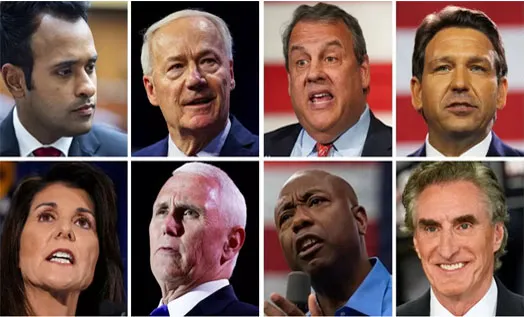Republican Debate Analysis: Identifying Winners and Losers
The inaugural Republican presidential debate unfolded as an energetic event, featuring eight contenders who engaged in impassioned dialogues. The absence of the charismatic Donald Trump, a showman of the highest order, led some to anticipate a lackluster affair.
Contrary to expectations, the debate proved to be anything but dull. The assemblage of eight opponents in Wisconsin demonstrated their capacity to ignite excitement even without Trump’s presence.
Several participants managed to distinguish themselves, while others found themselves overshadowed. The ensuing breakdown details the individuals who emerged as winners and those who faced setbacks.
WINNERS
Vivek Ramaswamy: Despite having never pursued elected office and abstaining from voting for a president from 2004 to 2020, Ramaswamy emerged as a dominant force in the Republican debate. With his infectious smile and sharp verbal acumen, he seemed to relish the proceedings. His relative political inexperience allowed him to confront attacks from fellow contenders adeptly.
Notably, he critiqued Christie’s behavior as resembling an audition for a left-leaning news network and accused Haley of pursuing positions favorable to defense contractors. During a discussion on climate change, Ramaswamy claimed to be untethered by financial interests, a statement that drew ire from opponents.
Ramaswamy effectively positioned himself as an outsider, opposing a field of entrenched political insiders. His stances, including advocating for Ukraine to cede territory to Russia, using military force to secure the US-Mexico border, and restricting US corporations from engaging with China, deviate significantly from mainstream Republican politics.
Yet, as Trump’s 2016 campaign demonstrated, even unconventional policy proposals can generate attention. Although challenging Trump for the nomination might be beyond his grasp, Ramaswamy’s performance in the debate solidified his role as a significant figure in the upcoming months.
Mike Pence: A seasoned politician with a congressional, gubernatorial, and vice-presidential history, Pence exhibited his fighting spirit. Despite his faltering presidential campaign, which alienated both Trump supporters and critics, his debate experience served him well.
Pence launched early attacks, questioning Ramaswamy’s readiness and proclaiming that the moment didn’t warrant on-the-job training. He passionately advocated for abortion restrictions based on religious grounds, a stance that might not resonate in the general election but could attract evangelical Republicans, pivotal in states like Iowa and South Carolina.
During discussions about Trump, Pence had the final say, emphasizing his prioritization of the Constitution on January 6, 2021, when he resisted Trump’s election result challenges. Even rivals voiced support for Pence. Although challenges persist in Pence’s campaign, he managed to remind conservative Republicans why he was once considered presidential material.
Nikki Haley: The former US ambassador to the UN, known for surpassing expectations, continued to defy underestimation. Having never lost an election, even when contending against established Republican opponents for South Carolina governor, Haley demonstrated her prowess during the debate.
She critiqued both Trump and the Republican Party, attributing the substantial US budget deficit to the party. She characterized Trump as the nation’s most unpopular politician and warned of the party’s general election prospects.
Haley engaged fiercely, sparring with Ramaswamy over US aid to Ukraine and with Pence on abortion, deeming his call for a national abortion ban unrealistic and politically detrimental. While victory in the current contest might be elusive, Haley’s debate performance positions her well for future presidential bids in non-Trump-dominated election years.
MIDDLE OF THE PACK
Tim Scott and Chris Christie: As anticipated, Christie engaged in pointed exchanges with Trump, delivered clever jabs at Ramaswamy, and showcased his combative demeanor. Yet, he faced jeers from the audience and failed to endear himself by likening Ramaswamy to ChatGPT.
Tim Scott maintained a genial disposition, largely avoiding confrontations during heated moments. Although this approach may not yield significant voter support, it could bolster his chances of securing the vice-presidential nomination under Trump.
LOSERS
Ron DeSantis: Initially a leading contender alongside Trump, DeSantis’ poll numbers declined as the year progressed. The debate likely exacerbated this decline. While his performance wasn’t disastrous – highlighted by his military service record and advocacy for robust government responses to the opioid crisis – he remained sidelined during pivotal discussions.
Ramaswamy overshadowed him, and Pence and Haley dominated conversations on abortion and Ukraine. His response to Trump-related topics seemed unsteady. DeSantis’ inability to bridge the gap with Trump dampened his standing in a race where he was once touted as a Republican Party future.
Asa Hutchinson and Doug Burgum: Hutchinson, the last candidate to qualify for the debate, and Burgum, who secured his place with a campaign gimmick, both failed to make a significant impact.
Hutchinson’s criticisms of Trump paled in comparison to Christie’s more pointed critiques, and Burgum’s small-state conservatism struggled to stand out. Their lackluster performances could hinder their chances of qualifying for future debates with stricter entry criteria.
IN SUMMARY
The inaugural Republican debate showcased remarkable winners and unfortunate losers. Vivek Ramaswamy’s unexpected prominence, Mike Pence’s experienced defense, and Nikki Haley’s assertive stance were notable triumphs. Tim Scott and Chris Christie occupied a middle ground, while Ron DeSantis, Asa Hutchinson, and Doug Burgum encountered setbacks that could impact their campaigns moving forward.
